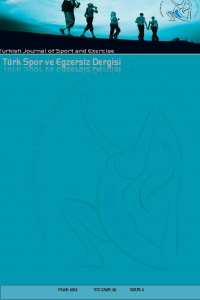Abstract
The
research was conducted with the aim of examining the visual reaction values of
deaf elite wrestlers (D) and normally hearing elite wrestlers (H). To work, 9
deaf wrestlers (height 179,55±3,74, body weight 78±11,09) and 9 normally
hearing wrestlers who participated in national and international competition
were voluntarily joined the research. All of the athletes who are deaf subjects
consist of at least 55 dB hearing loss in both ears. The visual hand reaction
values of the wrestlers were measured using the electronic reaction time meter
Newtest 1000. In the study, all participants’ dominant hand were right hand.
The data were analyzed using the SPSS (Version 22.0) program. Independent T
test was performed to determine the difference between the two groups in which
the obtained data showed normal distribution. The significance level was
evaluated as p <0.05. In the study findings, the average of right and left
hand reaction timing between groups and between intergroup were similar, D
group had significantly higher height and body weight averages than group N (P
<0.05). As a result; deaf athletes have similar reaction times to normal
athletes so it is seen that loss of hearing does not make a difference at least
in the result of this study.
Keywords
References
- 1. Fernández O. Historias de los tiempos de reacción [Histories about reaction times] . Atletismo Español, 2010; 635, 60 - 61.
- 2. Soto-Rey J, Pérez-Tejero J, Rojo-González JJ, & Reina R. Study of reaction time to visual stimuli in athletes with and without a hearing impairment. Perceptual And Motor Skills, 2014; 119(1), 123-132.
- 3. Naz S. Hearing Loss. InTech Publication, 2012.
- 4. Hallahan DP, & Kauffman JM. Exceptional children: Introduction to special education (4th ed.). Englewood Cliffs, NJ: Prentice-Hall, 1988.
- 5. Karakoç Ö, Çoban B, & Konar N. İşitme engelli milli sporcular ile spor yapmayan işitme engellilerin benlik saygısı düzeylerinin karşılaştırılması. Selçuk Üniversitesi Beden Eğitimi Ve Spor Bilim Dergisi, 2012; 14(1), 12-17
- 6. Seitz PF, Rakerd B. Auditory stimulus intensity and reaction time in listeners with longstanding sensorineural hearing loss. Ear And Hearing, 1997; 18(6), 502-512.
- 7. Sladen DP, Tharpe AM, Ashmead DH, Grantham DW, & Chun MM. Visual attention in deaf and normal hearing adults: effects of stimulus compatibility. Journal of Speech, Language, and Hearing Research, 2005; 48(6), 1529-1537.
- 8. Codina C, Buckley D, Port M, & Pascalis O. Deaf and hearing children: a comparison of peripheral vision development. Developmental Science, 2011; 14(4), 725-737.
- 9. Ciğerci AE, Aksen P, Cicioğlu İ & Günay M. 9-15 yaş grubu işitme engelli ve işitme engelli olmayan öğrencilerin bazı fizyolojik ve motorik özelliklerinin değerlendirilmesi, 2011;13, 35-42.
- 10. Özengin, N, Öztürk A, & Sertel M. A comparison of reaction times between adolescents with visual and auditory impairment and those without any impairment. Türk Fizyoterapi ve Rehabilitasyon Dergisi/Turkish Journal of Physiotherapy and Rehabilitation, 2013; 3(24), 1-6.
- 11. Lore WH, & Song S. Central and peripheral visual processing in hearing and nonhearing individuals. Bulletin of the Psychonomic Society,1991; 29(5), 437-440.
- 12. Finney EM, Fine I & Dobkins KR. Visual stimuli activate auditory cortex in the deaf. Nature Neuroscience, 2001; 4(12), 1171.
Abstract
References
- 1. Fernández O. Historias de los tiempos de reacción [Histories about reaction times] . Atletismo Español, 2010; 635, 60 - 61.
- 2. Soto-Rey J, Pérez-Tejero J, Rojo-González JJ, & Reina R. Study of reaction time to visual stimuli in athletes with and without a hearing impairment. Perceptual And Motor Skills, 2014; 119(1), 123-132.
- 3. Naz S. Hearing Loss. InTech Publication, 2012.
- 4. Hallahan DP, & Kauffman JM. Exceptional children: Introduction to special education (4th ed.). Englewood Cliffs, NJ: Prentice-Hall, 1988.
- 5. Karakoç Ö, Çoban B, & Konar N. İşitme engelli milli sporcular ile spor yapmayan işitme engellilerin benlik saygısı düzeylerinin karşılaştırılması. Selçuk Üniversitesi Beden Eğitimi Ve Spor Bilim Dergisi, 2012; 14(1), 12-17
- 6. Seitz PF, Rakerd B. Auditory stimulus intensity and reaction time in listeners with longstanding sensorineural hearing loss. Ear And Hearing, 1997; 18(6), 502-512.
- 7. Sladen DP, Tharpe AM, Ashmead DH, Grantham DW, & Chun MM. Visual attention in deaf and normal hearing adults: effects of stimulus compatibility. Journal of Speech, Language, and Hearing Research, 2005; 48(6), 1529-1537.
- 8. Codina C, Buckley D, Port M, & Pascalis O. Deaf and hearing children: a comparison of peripheral vision development. Developmental Science, 2011; 14(4), 725-737.
- 9. Ciğerci AE, Aksen P, Cicioğlu İ & Günay M. 9-15 yaş grubu işitme engelli ve işitme engelli olmayan öğrencilerin bazı fizyolojik ve motorik özelliklerinin değerlendirilmesi, 2011;13, 35-42.
- 10. Özengin, N, Öztürk A, & Sertel M. A comparison of reaction times between adolescents with visual and auditory impairment and those without any impairment. Türk Fizyoterapi ve Rehabilitasyon Dergisi/Turkish Journal of Physiotherapy and Rehabilitation, 2013; 3(24), 1-6.
- 11. Lore WH, & Song S. Central and peripheral visual processing in hearing and nonhearing individuals. Bulletin of the Psychonomic Society,1991; 29(5), 437-440.
- 12. Finney EM, Fine I & Dobkins KR. Visual stimuli activate auditory cortex in the deaf. Nature Neuroscience, 2001; 4(12), 1171.
Details
| Primary Language | English |
|---|---|
| Journal Section | Articles |
| Authors | |
| Publication Date | August 31, 2018 |
| Acceptance Date | July 20, 2018 |
| Published in Issue | Year 2018 Volume: 20 Issue: 2 |
Cite
Cited By
Investigation of Athletic Performances of Racket Sportsmen
Turkish Journal of Sport and Exercise
https://doi.org/10.15314/tsed.1502919
Turkish Journal of Sport and Exercise is licensed under a Creative Commons Attribution-NonCommercial 4.0 International License (CC BY NC).


